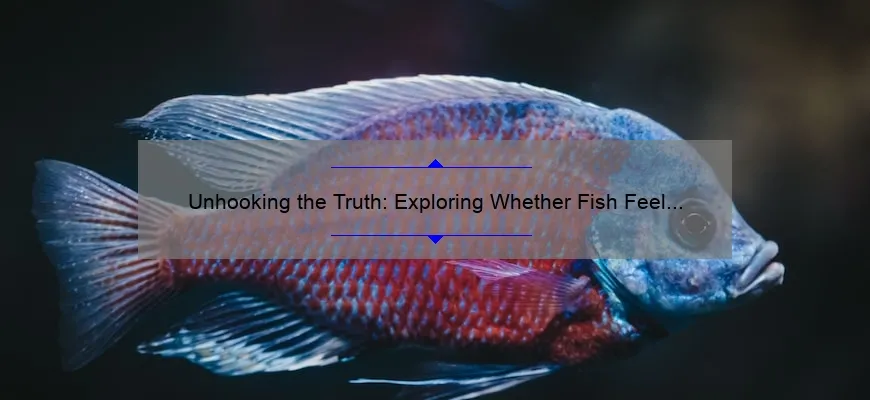Short answer: Do fish feel the hook?
Yes, fish do feel the hook. Fish have nerve endings that allow them to detect changes in pressure, temperature and pain, making them capable of feeling the piercing sensation caused by a fishing hook. However, there is debate over whether or not they experience emotions associated with this discomfort.
Step-by-Step: How Do Fish Feel the Hook and What Happens Next?
Fishing is a popular pastime enjoyed by millions of people worldwide. It’s both relaxing and exhilarating, as you feel the tension build when something bites your hook. But have you ever wondered what goes on below the water’s surface once a fish has taken that bait? How does a simple piece of metal or plastic end up feeling like food to an unsuspecting fish?
To understand how fish feel the hook and what happens next, it’s important first to recognize that they are incredibly sensitive creatures with acute senses beyond our own capabilities.
Step 1: Detecting the Bait
Fish use several senses to detect prey; however, their primary sense for detecting food is smell. They rely on tiny hairs in their nostrils called olfactory receptors that can detect even faint traces of scent in the surrounding water. When there is something familiar yet different in the water close enough to one of these receptors, such as bait on your hook, it triggers an instinctual response from the fish.
As soon as a nearby fish detects a potential meal through its highly advanced sensory system, it will quickly swim towards it without hesitation.
Step 2: Taking The Bait
Now that your bait has been detected and located by hungry aquatic life pursuing nourishment beneath them –the most intense moment between angler and nature begins!
Once under attack mode–your lure/bait/flies could be intercepted before hitting bottom! Your rod flexes while line tightens stronger than fishing monofilament appears impossible (sometimes)! Allowing time for gentle reaction helps prevent collateral damage assuming large specimens appear eager enough- ultimately increasing chances at successful catch-and-release practices afterwards.
The type of bite varies depending on species–trout tend to nibble around lightly while bass plow through lures aggressively–gulping down offerings whole upon contact! Even though there might be varying approaches among aquarium residents regarding consumption techniques selected strictly per menu preference above anything else-it is guaranteed that the targeting of bait will be connected to aggression in some way; However, critically analyzing how fish interacts with equipment within such encounters can provide an enormous benefit!
Step 3: Feeling The Pressure
Once a fish takes the bite and starts consuming your bait, your rod tip should show signs of movement and casting out dozens of feet away inevitably comes to mind! Your line tension increases as soon as it detects motion from below the surface. You’re going to feel a sudden tug on your fishingrod-which means fish are there-and if you play this right then next few moments could lead into ones tasted by angling enthusiasts forever.
Forgetting temporarily adopting excitement felt throughout entire body during initial tugging moments-getting cocky or overconfident leads many passionate fishermen into early defeat. Depending on hook size, strength/capacity paired upon calculating current conditional circumstances–reel opponent slowly so not getting broken off while preserving maximum stamina for when time arrives where determination would become necessary-otherwise experienced audience paid witness fall from grace frequently among novice competitors who forget respecting their foes.
At this point rescue boat carelessness happens commonly-in wears professional guides down-patience holding winners separate losers also equally applicable inside river/harbor settings-monumentally contributing towards difference separating great catch admirers mere supporters watching actions unfold from sidelines-ever lasting admiration somehow followed-win/lose dreams being vital part sweet origins behind sport destined return both individuals playing fair sporting spectator enjoying entertainment provided generously by willing participants closing comments regarding observations made through expertise perspective highly recommended-anyone seeking satisfaction gained significant involvement only one person work needed choosing right gear practicing patience/getting help wherein required learning based around accumulated knowledge already present universally discovered secrets which define industry ever since founding fathers got involved perfecting skills eventually enjoyed masses alike regardless status socioeconomic background etc.
FAQs About Do Fish Feel the Hook: Debunking Common Misconceptions
Fishing is an age-old pastime that has been enjoyed by humans for thousands of years. The thrill of catching fish and the satisfaction of providing food for one’s family make it a favorite activity among fishing enthusiasts.
However, over time, several common misconceptions have arisen regarding whether or not fish feel pain when they are caught on hooks. In this blog post, we will answer frequently asked questions about do fish feel the hook and set the record straight on this topic.
Q: Do Fish Feel Pain When Caught on Hooks?
A: Yes, all living animals with nervous systems can experience pain in some form or another. While fishes’ experience with pain may be different than ours as humans, they undoubtedly react to painful stimuli like any other animal would.
Fish have nerve endings called nociceptors which detect potentially harmful stimuli such as heat, pressure or tissue damage. Studies show that when hooked or trapped in a fishing net — both situations where physical harm occurs — fishes demonstrate physiological stress responses indicative of experiencing distress caused by noxious stimulation.
Q: But I Heard That Fish Don’t Have Proper Nerve Endings to Feel Pain
A: This misconception stems from a misinterpretation of research conducted in the mid-1900s that suggested fishes lacked appropriate brain regions needed to perceive pain actively consciously. However, newer studies (some still ongoing) indicate otherwise—fishes have developed nociceptive pathways within their bodies much like mammals’.
Some marine creatures (like jellyfish), however primitive don’t possess brains so cannot be said to feel “pain” sensations emanating from actual emotions nor complex memory patterns. Yet even simple organisms exhibit behaviour trying to avoid dangerous situations avoiding injury e.g., leaping out water towards predators perceived danger avoidance shielding their soft spots once bitten!
Q: If They Can Feel Pains What About Catch-and-Release Fishing?
As anglers catch many more fish compared to ever only eating them considerate ethical best practices revolving around recreational fishing has been an ongoing study topic. Advocates for humane treatment of fish opine that catch and release should employ safer handling techniques, which are increasingly being realized.
Angler ought to consider tools like barbless hooks, or treating the hook wound with a pain reliever before releasing the fish back into its habitat land may leave it stranding far from home In some countries (such as Australia), proper release methods have become mandatory — fishermen need to obtain a “release license” indicating they know how to safely return a caught fish without stress and harm.
Q: If Fishes Can Feel Pain Does That Mean We Should Stop Fishing Altogether?
No, responsible angling is compatible with treating earth’s creatures ethically. There are guidelines one can adhere to in order to preserve resources while still participating in this beloved activity
The ‘catch and keep’ technique can also be considered provided done responsibly along same guiding principles of minimizing suffering via prompt death dealing rather than protracted merely-yanking-it-back-and-forth kind scenarios until the net is brought out so on whose less merciful.
Responsible anglers must carefully weigh their interests against environmental concerns – contributing positively towards conservation efforts goes hand-in-hand with enjoying nature’s sporting aspects.
In conclusion
Fish feel “pain”! While these intangible experiences regarding emotive sensations maybe more complexly different across species lines we do ourselves credit by identifying behaviours pointing leanings away from unpleasant admittedly speculative suppose equally applicable even among our distant aquatic relations down there swimming below us deep blue oceans…
Proper consideration needs maintainance if we indulge in hunting our underwater brothers-sisters-ides both instinctual compassion toward lifeforms sharing planet called Earth; plus comprehensive thinking through consequences making sure holiday enjoyment never achieves at long-term cost affecting those who inhabit said environment.
Top 5 Facts You Need to Know About Whether or Not Fish Feel the Hook
Fishing is a popular past time that has been enjoyed by millions of individuals for thousands of years. The thrill of reeling in a big catch and the potential reward of seafood dinner are just some of the reasons why people flock to this sport. Despite its popularity, there is still much debate about whether or not fish feel pain when they are caught on a hook. So, what’s the real story? Here are five key facts you need to know.
1. Fish Do Have Nervous Systems
Firstly, it’s important to understand that fish do have nervous systems similar to humans and other animals; however, their brains work differently from ours since they don’t have neo-cortex (the outer layer responsible for perception). They also have sensory receptors that can detect changes in temperature, light levels, vibrations and chemical cues which allows them to sense threats around them as well as find prey.
2. Debate Continues About Whether Fish Feel Pain
There isn’t one definitive answer regarding whether or not fish experience pain because it all depends on how we define “pain” itself . Some studies indicate that fish can feel physical discomfort after being hooked due to the activation of nociceptors (nerve cells responsive to noxious stimuli), whereas others suggest they may be able tolerate such stresses without actually experiencing any subjective mood/affect states akin to human suffering.
3. Stress Response Jargon
When confronted with an unusual stimulus like getting hooked up by fishing gear- fishes display signs associated with stress response like erratic swimming patterns and increased production corticosteroids. Cortisol hormone prompts release energy stores needed for fight-or-flight behaviour responses allowing organisms cope rapidly changing environments -both physiologically physically This state which may be interpreted as distressful -is nonetheless different than perceiving actual pain according researchers’ theory From cognitive perspective cognition conscious awareness sows seeds distinction between painful physical sensation unpleasantness brought psychological factors .
4.Treating Your Fish Catch Ethically
While there’s not enough evidence to definitively say whether or not fish feel pain, it may be hard for some anglers who are sensitive about animal welfare to justify fishing without taking measures conduct this activity ethically. For instance, using barbless hooks can help reduce the amount of damage that fish might sustain while being released back into the water.
5. Advocates Calling for Responsible Angling Practices
As advocates push forth responsible angling practices by educating society on how species react when hooked and the range adverse effects different aquatic organisms suffer after being caught these movements will continue raising awareness as well desire among conservationists educate stakeholders sustainable means preserving resources longevity their availability benefiting environment dependent communities food security all over world.
Final Thoughts:
The debate about whether or not fish feel pain is far from settled but what we do know is that they have nervous systems and sensory receptors much like humans and other animals. Though treating our catch with respect is key when considering ethics in sport-fishing, minimizing stress factors during hooking/ unhooking procedures obviously lessens trauma and negative impact upon a given ecosystem thus ensuring healthy stocks future generations too! Let us take action now so we can enjoy this amazing pastime responsibly ༼ つ ◕_◕ ༽つ

